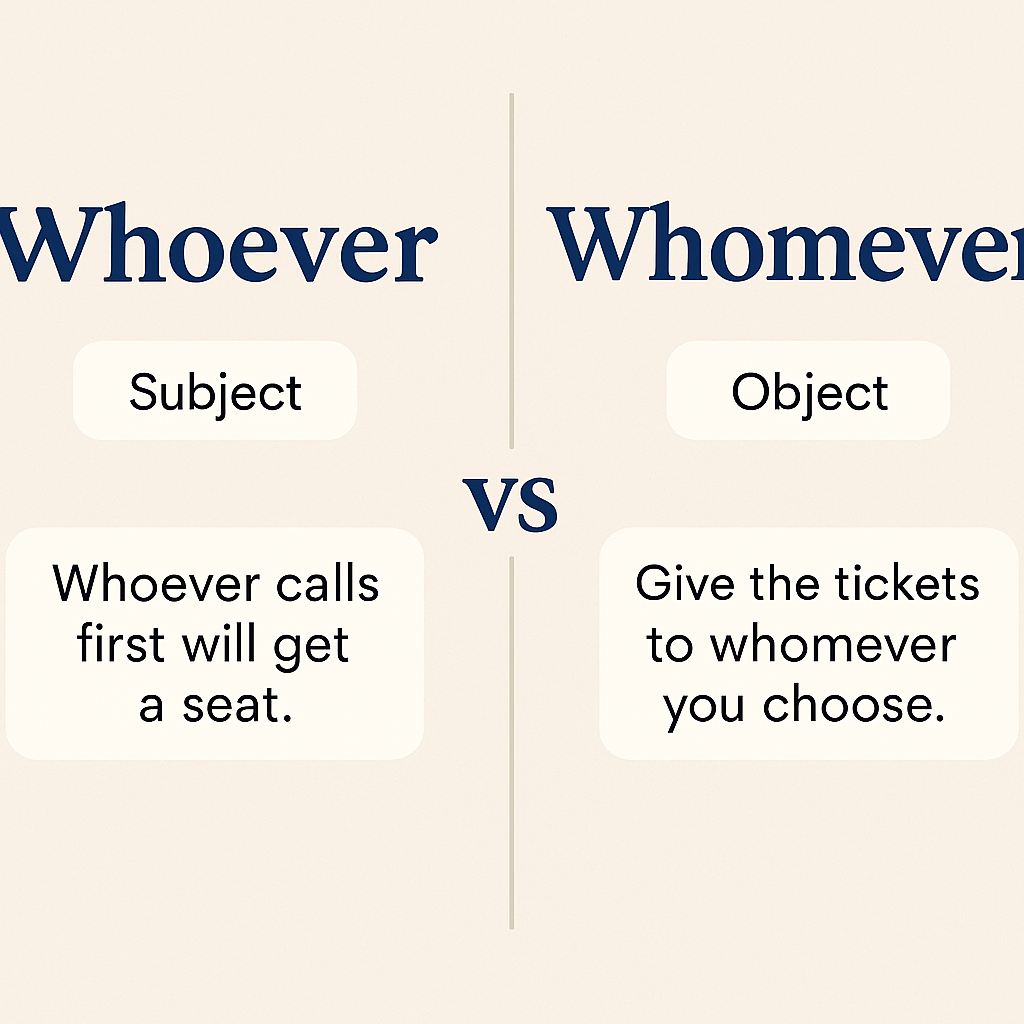Whoever vs Whomever

Deciding between whoever vs whomever can be confusing, even for native English speakers. Both words are used to refer to people, and both introduce clauses. The challenge lies in understanding when each is grammatically appropriate.
The key difference in whoever vs whomever comes down to subject vs object usage. “Whoever” acts as the subject of a clause, while “whomever” is the object. If you’re unsure which to use, you’re not alone, it’s one of the most misunderstood grammar topics in English writing.
This article will guide you through the grammatical rules that separate whoever vs whomever, give real-life examples, point out common errors, and offer simple memory tricks to help you use them with confidence in any sentence.
Grammatical Explanation of whoever vs whomever
The difference between whoever vs whomever is based on their function in a sentence or clause:
- Whoever is a subject pronoun. It does the action.
Example: Whoever arrives first will get a seat. - Whomever is an object pronoun. It receives the action.
Example: Give the tickets to whomever you choose.
To figure out whether to use whoever or whomever, look at the role the word plays within its own clause, not the larger sentence.
Quick trick:
- If you can replace it with he/she, use whoever.
- If you can replace it with him/her, use whomever.
Understanding the grammar behind whoever vs whomever helps you write with clarity and grammatical accuracy.
Real-Life Examples of whoever vs whomever
Correct Usage of “Whoever”:
- Whoever calls first will get the prize.
- I’ll talk to whoever is in charge.
- Whoever made this mess needs to clean it up.
Correct Usage of “Whomever”:
- You can assign the task to whomever you trust the most.
- Give this gift to whomever you like.
- The reward goes to whomever the committee selects.
Incorrect Usage:
- Whoever you choose will be great. (Should be whomever)
- Whomever wants to volunteer can sign up here. (Should be whoever)
These examples show that the whoever vs whomever decision hinges on whether the word is the subject or object of the clause it introduces.
Common Mistakes
The most common mistake with whoever vs whomever is choosing based on the sentence structure as a whole, rather than focusing on the clause the word introduces.
For example:
- Incorrect: I’ll give this to whoever you suggest.
➤ “You suggest him/her” → use whomever - Incorrect: Whomever arrives early will get a spot.
➤ “He/she arrives early” → use whoever
Another issue is overcorrecting, some people assume whomever sounds more formal and always use it, which leads to awkward grammar.
Always determine if the word is doing the action or receiving it. That’s the core of the whoever vs whomever rule.
Memory Tips
Here’s a quick trick to remember whoever vs whomever:
- Whoever = He/She = Subject
“Whoever makes the call decides the outcome.” → He makes the call. - Whomever = Him/Her = Object
“Give it to whomever you like.” → You like him.
Mnemonic:
- Whoever = does the action
- Whomever = receives the action
Still unsure? Try replacing the whole clause:
- “Give the prize to [he/she] wins.” → Doesn’t work
- “Give the prize to [him/her] you choose.” → Works → use whomever
This approach will make the whoever vs whomever choice much easier, especially in complex sentences.
For more grammatical tips in our blog Grammar/Usage Confusion
Conclusion
In the end, the whoever vs whomever debate is about grammar roles. Use whoever as a subject and whomever as an object. When in doubt, test the clause with he/him or she/her to decide.
Want more clarity on tricky pronouns? Visit this GrammarBook guide on who vs whom.